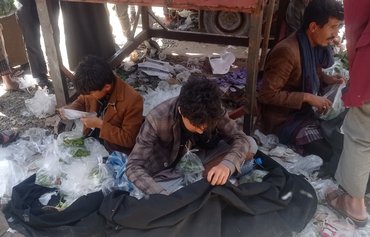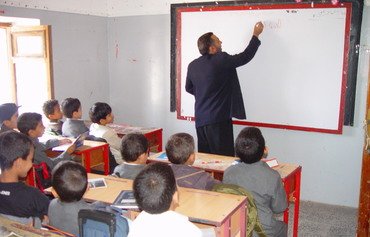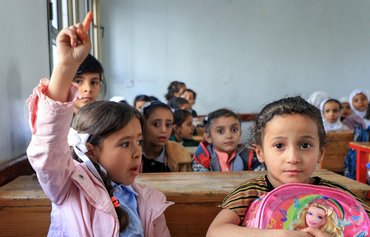ADEN -- When she went to enroll her son in his second year of high school in Houthi-controlled Sanaa, Umm Haitham told Al-Mashareq she was surprised by the steep increase in public school registration fees.
Al-Kuwait School asked for a 8,500 YER ($40) registration fee for the new school year, she said, and stipulated payment in advance to admit her son.
"Last year, the registration fees were only 1,000 YER ($4), while this year the fees are insanely high, even though textbooks have not been delivered," she said.
The increased school costs have made it harder for some to obtain an education.
![Yemeni parents wait for school doors to open on July 23 to register their children for the school year, which already started the day before in Houthi-controlled areas, a whole month earlier than previous years. [Haitham Mohammed/Al-Mashareq]](/cnmi_am/images/2023/07/24/43142-yemen_pic_2-600_384.jpg)
Yemeni parents wait for school doors to open on July 23 to register their children for the school year, which already started the day before in Houthi-controlled areas, a whole month earlier than previous years. [Haitham Mohammed/Al-Mashareq]
Twenty-year-old university student Noor Muhammad said she had to discontinue her studies and get a job at a private school when her family was forced to divert the little money it had to cover her brothers' school expenses.
The school year started early in Houthi-controlled areas, she said, and "the [financial] circumstances of parents were not taken into account, after they were severely constrained by the expenses and demands of Eid al-Adha".
"The requirements of the school year are many, including high tuition fees," she said, even though her three brothers are enrolled in a state school that "is supposed to be free".
The Houthis announced the new school year would start July 22, more than a month ahead of schools in government-controlled areas, which begin August 27.
But public schools have suffered extreme neglect under the group's rule and, in addition to a shortage of teachers, have not been provided with textbooks or educational aids.
The Iran-backed group has put little effort into encouraging families to send their children back to school and to prepare them for the new school year through the type of campaigns typically mounted via media and mosque preachers.
But it has made every effort to launch and advertise summer camps that indoctrinate children with its sectarian ideology and groom them to fight in its ranks.
Additional tuition fees
A Sanaa public school principal who asked that his real name not be used told Al-Mashareq that he and the Education Office agreed on the fee with parents.
His school is asking for "1,500 YER ($6) per month for primary school students and 3,000 YER ($12) for secondary school students", he said, as "a contribution from the community to support education".
Some schools ask that tuition fees be paid monthly, while others ask for the entire amount up front, because many parents do not make good on paying on a monthly basis, he said, which results in the teachers not getting paid.
Anwar noted that textbooks are not yet available but said some will be made available at a later date, depending on available resources and the effectiveness of the Education Office's process of distribution to public schools.
The Houthi-controlled Ministry of Education has imposed monthly tuition fees ranging from 1,000 YER ($4) to 1,500 YER ($6) on each student, said Fahd Murshid, director of the Education Office in New Sanaa district.
"The Ministry of Education has styled the parents' contribution as 'a contribution from the community' so that education can continue in light of the war and severance of teacher salaries," he told Al-Mashareq.
Tampering with education
Educators have criticised the Houthis' haste to start the school year in July without preparing the community via a back-to-school campaign.
The group has made no effort to mobilise children and families to return to school, said Abdul Ghani Musleh, who teaches Arabic at a Sanaa school.
Instead, he said, "the Houthis mobilised resources and the efforts of society, preachers and counselors over the course of the previous month of Ramadan to direct parents to enroll their children in the group's sectarian summer camps".
"The Houthis seek to render this generation ignorant and impose fees on all students in public schools, despite the lack of the most basic educational tools and textbooks and the absence of teachers," he told Al-Mashareq.
They are doing this "in order to push them to the battle fronts", he said.
Public sector employee Abdel Wahhab al-Reesh criticised the decision to launch the school year in the middle of summer, pointing out that no one took into account the timing for schools in desert areas.
Temperatures in some areas exceed 40 degrees Celsius, he said.
He accused the Houthis of turning schools into "sectarian schools that give attention to the sectarian occasions imposed on them by the group at the expense of the school curriculum".
As for the curriculum, he added, the Houthis have "tampered with and changed many of its subjects, deleted many lessons and replaced them with sectarian lessons that glorify Iranian ideology".
Houthi school supervisor
The Houthis have forced private and public schools to appoint a group-affiliated supervisor to implement the group's programmes and sectarian activities.
"The private school bears the burden of covering this supervisor's salary," said Shamsan Mohammed, the principal of a private school in Sanaa.
Economist Abdul Aziz Thabet noted that the Houthis have appointed Yahya al-Houthi, the brother of the group's leader, Abdul Malik al-Houthi, as their minister of education.
He criticised the Houthis' continued suspension of teacher salaries.
"The Houthis have generated revenues in all fields, which makes them capable of paying salaries, at least to teachers," he told Al-Mashareq.

![Al-Mutassem school in Sanaa, like most other public schools in the Houthi-controlled city, have seen low enrollment this year due to the earlier start of the school year on July 22. [Haitham Mohammed/Al-Mashareq]](/cnmi_am/images/2023/07/24/43140-yemen_pic_3-600_384.jpg)






